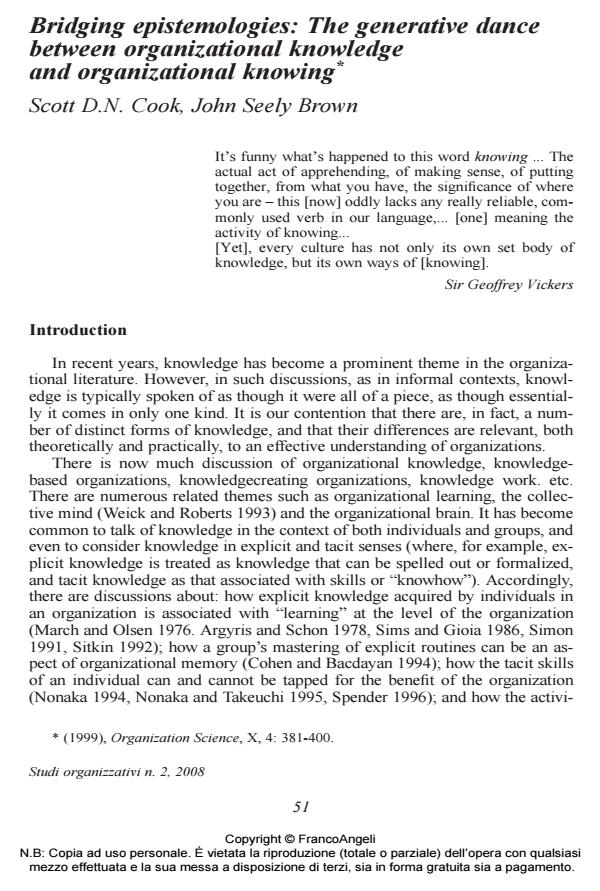Bridging epistemologies: The generative dance between organizational knowledge and organizational knowing
Titolo Rivista STUDI ORGANIZZATIVI
Autori/Curatori Scott D.N. Cook, John Seely Brown
Anno di pubblicazione 2009 Fascicolo 2008/2 Lingua Inglese
Numero pagine 0 P. Dimensione file 499 KB
DOI 10.3280/SO2008-002003
Il DOI è il codice a barre della proprietà intellettuale: per saperne di più
clicca qui
Qui sotto puoi vedere in anteprima la prima pagina di questo articolo.
Se questo articolo ti interessa, lo puoi acquistare (e scaricare in formato pdf) seguendo le facili indicazioni per acquistare il download credit. Acquista Download Credits per scaricare questo Articolo in formato PDF

FrancoAngeli è membro della Publishers International Linking Association, Inc (PILA)associazione indipendente e non profit per facilitare (attraverso i servizi tecnologici implementati da CrossRef.org) l’accesso degli studiosi ai contenuti digitali nelle pubblicazioni professionali e scientifiche
Bridgin Epistemologies: The Generative Dance between Organizational Knowledge and Organizational Knowing - Much current work on organizational knowledge, intellectual capital, knowledge-creating organizations, knowledge work, and the like rests on a single, traditional understanding of the nature of knowledge. We call this understanding the epistemology of possession. since it treats knowledge as something people possess. Yet, this epistemology cannot account for the knowing found in individual and group practice. Knowing as action calls for an epistemology of practice, Moreover, the epistemology of possession tends to privilege explicit over tacit knowledge, and knowledge possessed by individuals over that possessed by groups. Current work on organizations is limited by this privileging and by the scant attention given to knowing in its own right. Organizations are better understood if explicit, tacit, individual and group knowledge are treated as four distinct and coequal forms of knowledge (each doing work the others cannot), and if knowledge and knowing are seen as mutually enabling (not competing). We hold that knowledge Is a tool of knowing, that knowing is an aspect of our interaction with the social and physical world, and that the interplay of knowledge and knowing can generate new knowledge and new ways of knowing. We believe this generative dance between knowledge and knowing is a powerful source of organizational innovation. Harnessing this innovation calls for organizational and technological infrastructures that support the interplay of knowledge and knowing. Ultimately, these concepts make possible a more robust framing of such epistemologically-centered concerns as core competencies, the management of intellectual capital, etc. We explore these views through three brief case studies drawn from recent research.
- Langue, économie et entreprise : le travail des mots Jean-Yves Barbier, pp.201 (ISBN:9782878543834)
Scott D.N. Cook, John Seely Brown, Bridging epistemologies: The generative dance between organizational knowledge and organizational knowing in "STUDI ORGANIZZATIVI " 2/2008, pp , DOI: 10.3280/SO2008-002003